 Petzlover
Petzlover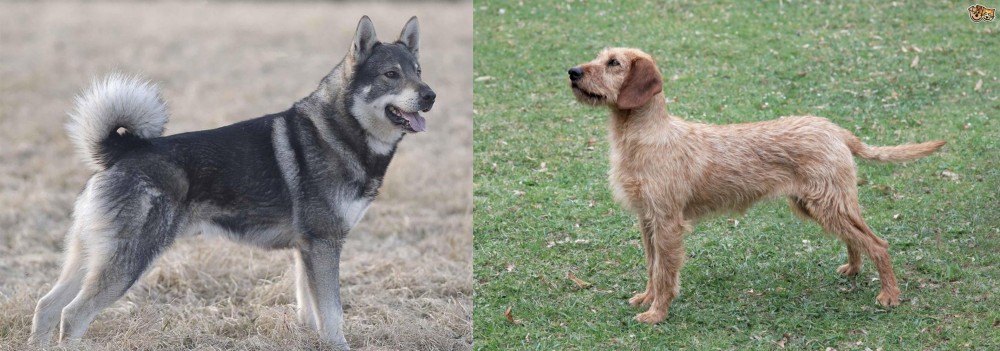 Jamthund is originated from Sweden but Styrian Coarse Haired Hound is originated from Austria. Jamthund may grow 12 cm / 5 inches higher than Styrian Coarse Haired Hound. Jamthund may weigh 17 kg / 38 pounds more than Styrian Coarse Haired Hound. Both Jamthund and Styrian Coarse Haired Hound has almost same life span. Both Jamthund and Styrian Coarse Haired Hound has almost same litter size. Jamthund requires Moderate Maintenance. But Styrian Coarse Haired Hound requires High Maintenance
Jamthund is originated from Sweden but Styrian Coarse Haired Hound is originated from Austria. Jamthund may grow 12 cm / 5 inches higher than Styrian Coarse Haired Hound. Jamthund may weigh 17 kg / 38 pounds more than Styrian Coarse Haired Hound. Both Jamthund and Styrian Coarse Haired Hound has almost same life span. Both Jamthund and Styrian Coarse Haired Hound has almost same litter size. Jamthund requires Moderate Maintenance. But Styrian Coarse Haired Hound requires High Maintenance
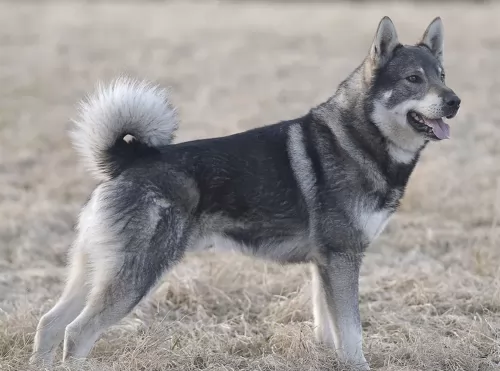 Known also as the Swedish Elkhound or Swedish Moosehound, the Jämthund is a dog which hails from Sweden, and more specifically from a region known as Jamtland.
Known also as the Swedish Elkhound or Swedish Moosehound, the Jämthund is a dog which hails from Sweden, and more specifically from a region known as Jamtland.
The dog received official recognition in 1946 as a dog breed from the Swedish Kennel Club. DNA testing tell us that these dogs originated from the crossing of a wolf, being described as a ‘Spitz-type dog’.
They were once used to pull sleds, and its why today he is an energetic dog, requiring a good dose of exercise and activities from his owners. The UKC accepted the dog as an official breed in 2006.
 The Styrian Coarse Haired Hound is a German hound, a medium sized breed that was found to originate in Styria in Austria. It was bred to be a boar hunting scent hound in the mountains. The breed is an Austrian Bracke and one of the largest. In the 1870’s the breed was developed by Karl Peintinger to get a hardy, rough coated hunting dog. Peintinger took the Istrian Hound and an old type scent hound of Hanoverian and continued selective breeding until he got the dog he wanted.
The Styrian Coarse Haired Hound is a German hound, a medium sized breed that was found to originate in Styria in Austria. It was bred to be a boar hunting scent hound in the mountains. The breed is an Austrian Bracke and one of the largest. In the 1870’s the breed was developed by Karl Peintinger to get a hardy, rough coated hunting dog. Peintinger took the Istrian Hound and an old type scent hound of Hanoverian and continued selective breeding until he got the dog he wanted.
The breed is still used to hunt boar and track wounded animals. They work in high altitudes and rough terrains. They were not created to be companion animals and most of them are still working dogs. They do not make great house or family pets. Because of these circumstances, the breed is rare today.
Sometimes you will see the breed called the Peintinger Bracke after its developer. The Austrian Kennel Club recognized the breed in 1889 and the Federation Cynologique Internationale as a scent hound. The Styrian Coarse Haired Hounds were next recognized in 2006 by the United Kennel Club in North America, but not the AKC – American Kennel Club. There are many smaller kennel clubs and organizations for the breed as well many hunting clubs.
As mentioned, the breed is the largest of the Austrian Brackes. They are one of the three breeds included in the Grand Brackes. The name comes from the fact that all these dogs were developed for hunting in the Austrian mountains. They are pretty much unknown in the rest of the world. They thrive in the harsh climates of the Austrian mountains.
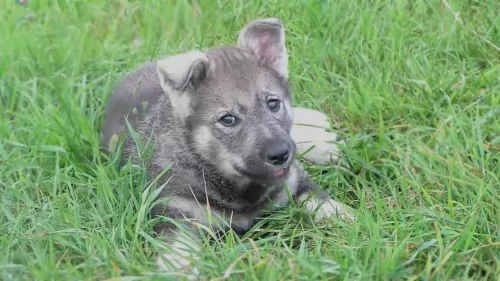 Described as a medium to large sized dog, the Jamthund stands at about 52 – 65cm in height, both males and females, and they weigh in at about 25 to 35 kilograms.
Described as a medium to large sized dog, the Jamthund stands at about 52 – 65cm in height, both males and females, and they weigh in at about 25 to 35 kilograms.
They have that typical Spitz-dog tail which curls over the back of the dog. When relaxed the tail hangs straight down. He has erect ears with a longish muzzle, much like a wolf, and his double coat lies fairly close to the body while on certain areas of the body, such as around the neck and tail, it is longer.
The color of his coat is usually light or dark grey with some cream marking around the muzzle, eyes, legs and paws. This fairly large, Spitz-type dog is certainly an attractive dog that while looking similar to a wolf shares some physical features with the Norwegian Elkhound.
Capable of being a splendid family pet, the Jamthund is an affectionate, loyal dog with his human family, although it is true that some of him hankers back to his hunting days.
He is an intelligent, amicable dog, and therefore training and socializing him is easy as he wants to please.
He is very energetic and won't be content with a life curled up indoors. He wants to be busy and involved with all your activities such as walks, hikes and swimming. He has a thick coat and he loves wintry weather, so the cold won’t stop him from wanting a long walk every day.
 The Styrian Coarse haired Hound is well muscled, medium sized and lithe. They run easily on all types and levels of terrain. Their coat is rough and harsh, giving the breed part of its name. They can tolerate both extremes of the climate temperatures. They are strong and confident dogs wearing a very serious facial expression. These guys are all about the job – the hunt. Their prey drive is extremely high.
The Styrian Coarse haired Hound is well muscled, medium sized and lithe. They run easily on all types and levels of terrain. Their coat is rough and harsh, giving the breed part of its name. They can tolerate both extremes of the climate temperatures. They are strong and confident dogs wearing a very serious facial expression. These guys are all about the job – the hunt. Their prey drive is extremely high.
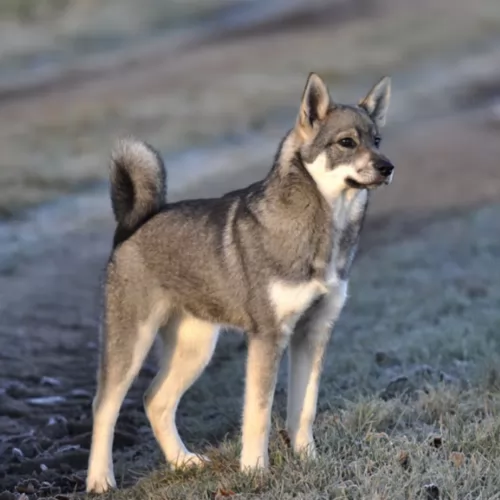 Loving the company of his human family, the Jamthund gets lonely, bored and frustrated if he is put into the backyard as a watchdog and left. When he becomes naughty it is because he is trying to tell you that he wants to be part of your life.
Loving the company of his human family, the Jamthund gets lonely, bored and frustrated if he is put into the backyard as a watchdog and left. When he becomes naughty it is because he is trying to tell you that he wants to be part of your life.
The Jämthund has excellent hunting skills and with his great intelligence too and his ability to learn easily, he makes a popular pet. He also has other attractive characteristics such as being brave and calm.
He forms a deep bond with his human family and his gentle nature makes him a favorite playmate of children too. They make good guard dogs as they are alert and protective of their human family.
Not only has the Jamthund got many positive characteristics to his name, he is an attractive dog too, and once you've brought one into your home you'll realize what a wonderful dimension it brings into your home and your life.
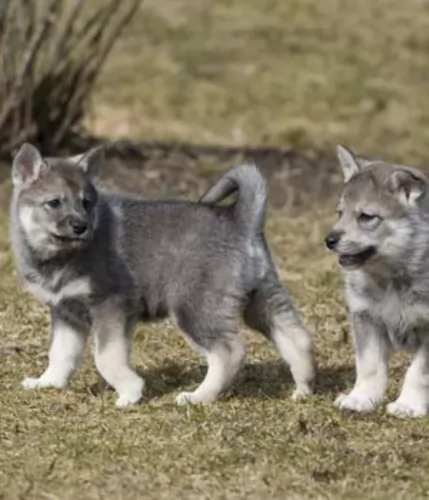 While the Jämthund is a healthy dog breed and won't cost you much in veterinary bills when it comes to illness, there are some common dog illnesses that are worth knowing about so you can respond in time to his need.
While the Jämthund is a healthy dog breed and won't cost you much in veterinary bills when it comes to illness, there are some common dog illnesses that are worth knowing about so you can respond in time to his need.
Unfortunately this is a joint problem that can affect even young dogs. The hip joint hasn't formed properly and it can lead to the development of painful arthritis. It can be a debilitating disease for your dog and you will need to see your vet.
This may seem like a trivial kind of dog illness but in fact it can lead to a lot of frustration, pain, anguish and discomfort for your pet. Signs of a skin allergy can include red, inflamed skin, itchiness, pain and oozing sores where your pet licks away miserably at the affected areas.
 The breed is fairly healthy and isolated from crossbreeding. They are susceptible to several major conditions.
The breed is fairly healthy and isolated from crossbreeding. They are susceptible to several major conditions.
• PRA or Progressive Retinal Atrophy = a group of degenerative, genetic eye diseases the cause blindness over time.
• Bloat – most large dogs suffer from this and not so much a medium breed like this one, but it is a condition that their energy levels and work ethics could lead to. Fatal if not treated immediately.
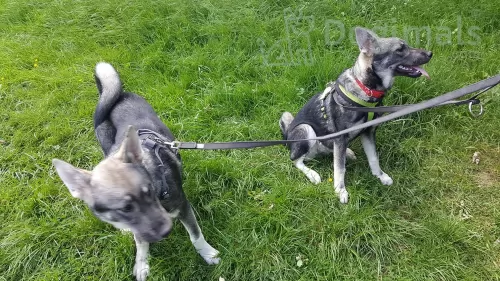 Your Jamthund is a high energy dog and because of his background of hunting and pulling sleds, he loves wide open spaces where he can run. He essentially suits country life and it wouldn't be wise to confine this energetic dog to a small home.
Your Jamthund is a high energy dog and because of his background of hunting and pulling sleds, he loves wide open spaces where he can run. He essentially suits country life and it wouldn't be wise to confine this energetic dog to a small home.
Brushing the thick coat twice a week will keep it in top condition.Keep his nails trimmed and also keep an eye on his teeth. Find out how to make use of canine toothbrush and toothpaste to keep his teeth clean and free of plaque.
Such a high energy dog requires the very best food packed full of vitamins and minerals. Look for the best commercially manufactured food there is and add in some wholesome home-made food from time to time such as cooked chicken, rice and vegetables as well as some raw meat occasionally. He must have a constant supply of fresh, cool water.
 1Feeding the puppy – Feed this very active breed a high quality dog food for medium sized dogs. Feed puppies 3-4 times a day a total of ¾ to 1 cup.
1Feeding the puppy – Feed this very active breed a high quality dog food for medium sized dogs. Feed puppies 3-4 times a day a total of ¾ to 1 cup.
2.Feeding the adult - feed this very active breed a high quality, high protein diet. Feed the adult 1-2 times a day a total of 1.6 cups of dry food.
4. Games and Exercises They are energetic, athletic and extremely agile. They are muscular and lithe and need a lot of exercise. The is a dog that can travel across rough terrain for hours at a time. They are tenacious hunters and need an outlet for that prey drive.
They need space and time to run. A large yard is great because you don’t want to take them to a dog park. Give them a lot of toys and puzzles. They excel at lure coursing, field trials and hunting trials. Their sense of smell makes them great at nose work and they like agility, tracking and rally obedience.